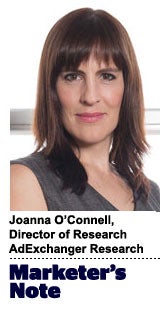 “Marketer’s Note” is a regular column informing marketers about the rapidly evolving, digital marketing technology ecosystem. This week it is written by Joanna O’Connell, Director of Research, AdExchanger Research.
“Marketer’s Note” is a regular column informing marketers about the rapidly evolving, digital marketing technology ecosystem. This week it is written by Joanna O’Connell, Director of Research, AdExchanger Research.
In a recent interview with CMO Today, Sir Martin Sorrell, CEO of holding company WPP Group, called the “in house” trend (i.e. marketers moving media buying – driven by the rise programmatic – out of agencies’ hands and inside the walls of marketing organizations), “a temporary phenomenon”, noting, “Our view is after a year or two it will change. I question whether [clients] will be able to apply technology successfully.”
It makes me think of two questions I raised at the end of the recently released research report on this subject, which I share here because they are apropos to Sir Martin’s argument:
What is one’s definition of effective? There is general agreement among marketers choosing the “In-House” path that they can do great work themselves, but a counter-argument that any programmatic shop (or holding company trading desk) would make, which is, frankly, compelling, is, “Can a small, lean group of marketers who are not steeped in programmatic really do better than what we could if given the chance?” Is there a performance trade-off to having one supply manager negotiating rates versus a whole team, or one platform expert versus a whole host of experts, regardless of money saved through fees not paid out? Asks one director of advertising and online marketing at a leading catalog and e-commerce retailer whose organization is currently migrating to a more complete in-house model, “How do you know for sure you can do it better? You don’t. And the arrogance of thinking you can do it better can be risky.”
Must the definition of “agency” necessarily evolve? Also at play is the evolving definition of “agency,” where the lines between the classic media agency and the new breed of service partner, such as from an independent programmatic shop, or even a DSP with a managed-service arm, continues to blur. It’s clear that even the most well staffed in-house media teams rely on external partners, whether for executional or strategic help. We live in an era of holding company trading desks, where debate continues to rage as to whether the model itself, or some of its specific practices, such as taking a principal role in media, are inherently at odds with the traditional definition of what it means to be an “agency” – and while the specific model of centralized service-based desk itself may not have long-term legs – the questions its advent raised just might.
Long and short, these may be philosophical arguments at their core –
- Does a marketing organization value 1 percentage point better performance if it doesn’t trust who’s managing its media dollars?
- What does a marketing organization believe an agency is really there to do for it, and is that marketing organization open to evolving its thinking in the face of such significant change?
This brings me back to Sir Martin’s position on the future of “in house” media management.
It’s a fascinating question: whether or not marketers will “cave” and return to agencies (because that’s basically what he’s implying). He might be right. He might not. He’s certainly right that client-driven margin pressure has been hard on the agencies* – it’s no surprise the holding companies doubled down on the higher margin business that is the trading desks; they are seeking financial success, as any good business does.
But it’s an awfully big gamble to take. Because adherence to the holding company party line without acknowledging – and working to come to a mutually agreeable solution to – the problem they helped create for their agencies and clients could prove a dangerous game.
As always, thoughts and comments are welcome.
Joanna
*It’s funny, I wrote a whole Marketers Note on this just a few weeks back and it seemed to fall flat. At the time I wondered – is it that the subject is too hot to touch, or are people so bored with it that they don’t bother engaging? Likely, it’s neither – it’s that it’s a problem without any easy or obvious solution.
Follow Joanna O’Connell (@joannaoconnell ) and AdExchanger (@adexchanger) on Twitter.











